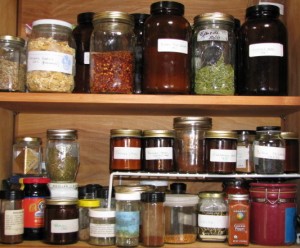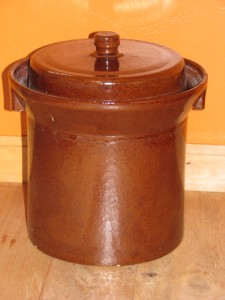To listen to a radio broadcast of The Herbal Highway on this topic click on this link, http://www.kpfa.org/archive/id/79617 .
I often talk about the importance of good digestion; as do many alternative health care practitioners. Good food, good eating habits and a healthy digestive system are the foundations of good health. Our food provides vital nutrients for our bodies to function properly. So we need the good food going in and the body working well to assimilate that food. Not new concepts but so important.
It is also important to realize that not only do the digestive and nervous systems interrelate; the digestive system has its own nervous system, the enteric nervous system. The enteric nervous system keeps track of a lot of what is going on. It isn’t just about the brain. Indeed, the brain is left out of a lot of the process.
In an article I read on a friend’s blog, http://nightingaleacupuncture.wordpress.com/2012/01/20/gut-health-brain-health/ , I learned a new fun fact about the digestive systems’ nervous system capacity. The small intestine alone has as many neurons, nerve cells, as the spinal cord. To me that is amazing to consider! The spinal cord, along with the brain, is called the central nervous system. Command central. Or so we thought.
We are learning that the heart has far more neurotransmitters than we thought and we are learning more about the complexity of the digestive systems’ nervous system. Another reason not to over-think things since the brain doesn’t have all of the information.
On an energetic level, and even a scientific one for those of you more comfortable in that realm, we really need to listen to our bodies and not let the brain have the final word in everything since it doesn’t have all of the information.
The health of your gut, or intestines, is not only important for your digestion, but studies are showing that gut health can also impact; bone formation, learning and memory, allergies, links to Parkinson’s Disease and inflammatory processes. This last one is really important because many major illnesses are rooted in inflammatory processes.
The Bugs: Good vs. Bad
Imbalances in the gut flora are also linked to anxiety, depression, autism and how the body responds to stress. It is important to note the studies aren’t saying this is necessarily the only factor, but an important one.
The beneficial bacteria that we have in our gut helps us to process our foods and can get out of balance for a number of reasons. One of the big ones is from taking antibiotics. Antibiotics are designed to kill micro-organisms in the body. They don’t discriminate and leave the beneficial bacteria alone. If you don’t make this up after taking antibiotics or over-use antibiotics, you can be setting yourself up for poor digestion at the least and potentially more serious, chronic illness.
Another reason our beneficial bacteria can get out of balance is a poor diet and from our digestive enzymes getting out of balance, which can happen for any number of reasons, stress being one of them.
Intestinal bacteria need to eat, and mounting evidence indicates that beneficial bacteria prefer nutrients called prebiotics, which are primarily found in high-fiber foods including onions, garlic, bananas, artichokes, and many greens.
Bad bacteria, on the other hand, prefer the sugars and fats found in processed foods. There is also evidence that a low-fiber, high-fat creates an environment for that helps the unhelpful bacteria to thrive.
There are many probiotic supplements that you can take these days. Some good products are out there and some not so good products. Like usual, I like to promote eating your medicine. Including foods in your diet that contain beneficial bacteria/probiotics is a great way to go. The main creatures you are looking for are lactobacillus acidophilus and bifidobacterium.
You can find organic dairy products containing these cultures; such as yogurt, kefir and sour cream. You can also look into fermented foods such as: pickles, sauerkraut, kimchi, miso, tempeh, soy sauce and vinegar. Not all pickles are equal. You want to look into the more natural versions of these foods.
Or, better yet, start making your own. The following books are good resources to get you started:
Nourishing Traditions by Sally Fallon, http://www.newtrendspublishing.com/SallyFallon/
Wild Fermentation and The Art of Fermentation by Sandor Katz, http://www.wildfermentation.com/
Continue to experiment in your cooking and try new foods. This will keep you interested and it is healthy for you to maintain a variety to your diet. Eat with conscious attention and gratitude and cook your food with love. You take this into your body as well.
The Stress Factor
Okay, now it is really time to get real. Our gut flora, if out of balance, can lessen our ability to handle stress. Conversely, being in a stressed state, fight or flight, lessens our body’s ability to digest well.
Many of you when you feel anxious get digestive disturbances and likewise, as I mentioned earlier, an imbalance in gut flora can cause anxiety and depression. So you can see what a vicious cycle you can get into with anxiety and stress.
So, it isn’t just what you eat and just how well your digestive system is working but it is also about what you are doing the rest of the day. Your lifestyle. There is no magic pill or magic food or magic herb. In order to fully participate in our health we have to look at our whole life. It is all connected. Even the scientists will tell you that; at least the physicists will.
The Herbs
I’m going to focus on a few herbs that are typically used in cooking. That means that you may already have them handy and if you don’t they are easy to find.
Talking about culinary herbs also highlights the important concept of eating our medicine. Most culinary herbs, around the world, either support digestion or help protect the body from unwanted microbes.
If you are cooking with dried herbs, soak them in a liquid medium before adding them to the food you are preparing. For instance, if your recipe calls for olive oil, broth, melted butter, lemon juice, etc., pour a little into a small bowl and let your dry herbs soak in that medium until you need it. This will help bring out the flavor of the herb as well as the medicinal qualities. Fresh herbs are often added in later in the cooking process to maintain the vibrancy of their flavor.
You can also make herbal vinegars and have these on hand to use in your cooking or as salad dressing. Making an herbal vinegar is quite simple and I’ll go over that process in an upcoming post.
Basil – carminative (stimulates the digestive tract to work correctly and with ease, soothes smooth muscles of the gut), nervine (supports the nervous system), helps with colic (gut spasoming)
Cardamom – flatulence, indigestion, sweetens breath, takes edge off adrenal stress from caffeine
Cayenne – antimicrobial, carminative, promotes stomach secretions, stimulates peripheral circulation, opens bronchi, strengthens heart, capillaries and arteries
Cinnamon – astringent, carminative, antimicrobial, helps dispel gas, diarrhea
Fennel – flatulence, indigestion, intestinal seasoning
Ginger – stimulates appetite, nausea, increases pelvic circulation, motion sickness with peppermint
Oregano – indigestion, cough, headache, poultice for painful swelling, emenagogue
Rosemary – circulatory and liver tonic, digestive aid, emenagogue, headache (make an infusion, soak a cloth and put on head, warm or cold depending upon the headache), antiseptic, skin toner, hair rinse for dark hair
Thyme – carminative, antiseptic, antispasmodic, works on lungs for shortness of breath
Turmeric – analgesic, astringent, anti-inflammatory, emenagogue, liver support, aids digestion
So get into that kitchen, put on your favorite music, cook up some medicine and share it with someone you love.
Be well!
Sarah

